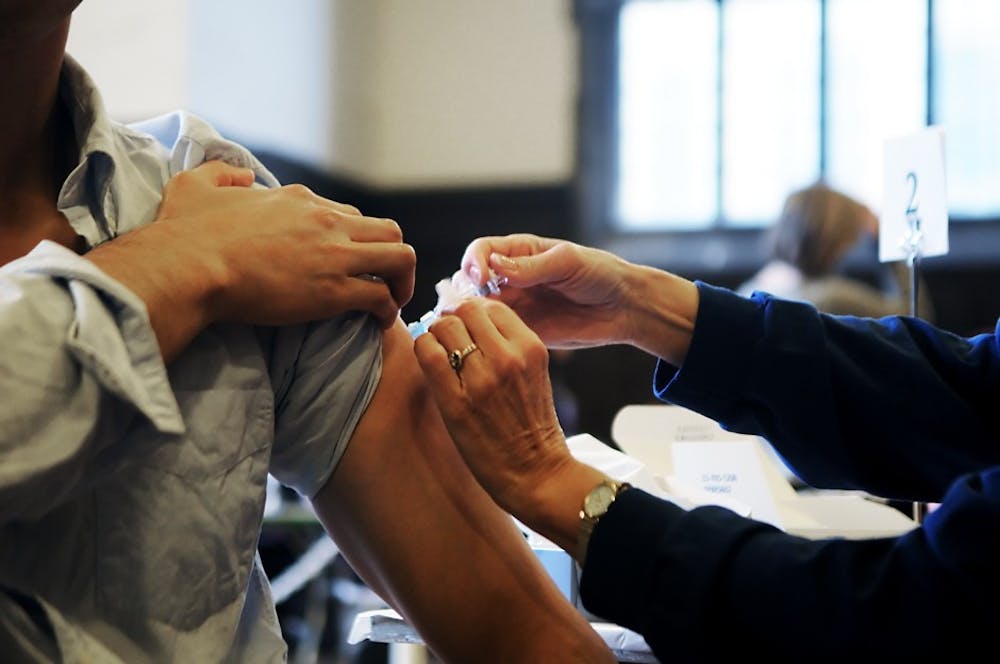
Penn students may be exempted from vaccinations if there is a medical contraindication or if religious or philosophical belief prohibits immunizations. (File Photo)
The surge in mumps cases at Penn and across Pennsylvania has prompted a discussion about vaccination regulations. While almost all students at Penn are compliant with their immunizations, Penn's policies do not require all students to be vaccinated.
Three Penn undergraduate students have been diagnosed with mumps as of April 9. None of the students are currently contagious or in isolation. Penn students, faculty, and staff were notified about the first case of mumps through an email from administrators on March 27. At Temple University, more than 140 cases of mumps have been reported, with isolated cases at Drexel University and Pennsylvania State University.
Policies at Penn grant certain students exemptions from being from vaccinated, Executive Director of Student Health Service Giang Nguyen said. Students can opt not to receive the vaccine if it threatens their health or if their religious or philosophical beliefs prohibit immunizations. He added, however, that students have no need to worry about large numbers of unvaccinated classmates.
Penn community’s immunization compliance rate at about 99%, Chief Wellness Officer Benoit Dubé said. Nguyen said that those who are officially exempt from vaccinations are classified as compliant and thus are included in the around 99% compliance tally. However, he added that the percent of those that qualify for exemptions is so small that it does not make a big difference on the overall compliance rate.
If students previously received a vaccination and had a life-threatening response, they are qualified for exemption, Nguyen said. In general, medical contraindication — when a vaccine threatens the health of a student — depends on each individual's history and is judged on a case-by-case level.
"A signed statement indicating specific medical contraindication from a Medical Doctor, Osteopath, Nurse Practitioner or a Physician Assistant is required for medical exemption," the immunization requirement document from SHS states.
Students with religious or philosophical beliefs that prohibit them from immunization can also file for exemption, but they must submit a signed "declaration of religious or philosophical objection" form, according to the immunization requirement document from SHS.
Although students can be exempted from immunization requirements, Nguyen said the "online student health history" and "tuberculosis risk screening form" must still be submitted.
"From a public health standpoint, we need to know whether someone is at risk for tuberculosis, and being at risk for tuberculosis doesn't mean that you are forced to be vaccinated," Nguyen said. "It really is a requirement so that we can identify people who need to have additional counseling about the probability of having tuberculosis themselves and to be offered treatment if they might have a latent infection."
The exemption policy is made by University administration in coordination with SHS and is a long-standing policy that has existed for decades, Nguyen said.
While Nguyen said the compliance rate is high at Penn, there is always a chance of an outbreak for diseases students are required to be vaccinated against. Nguyen said that is why the University often reminds students about the basic ways to avoid all infections, such as washing hands frequently, using hand sanitizer, and not sharing food, utensils, and personal objects like e-cigarettes.
Currently, Penn requires all students to show record of two doses of the measles-mumps-rubella vaccine or proof of immunity. But Nguyen said there is no statewide regulation for mumps vaccinations in colleges.
The only statewide regulation for immunization in college campuses is meningitis, a disease where there is inflammation of the protective membranes covering the brain and spinal cord.
The Daily Pennsylvanian is an independent, student-run newspaper. Please consider making a donation to support the coverage that shapes the University. Your generosity ensures a future of strong journalism at Penn.
Donate






